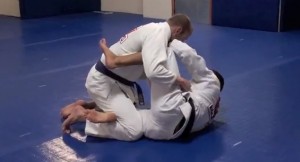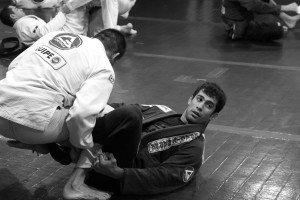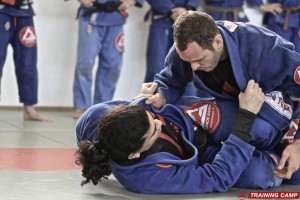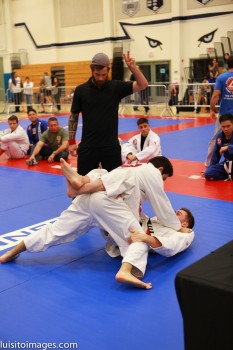My Guard Doesn't Work!
The BJJ guard is as essential in learning Jiu-Jitsu as breathing is to a human being. You need to master it. It has to be automatic! It has to be second nature. We know that a lot of BJJ players out there struggle with the guard. Now, before you decide to just forget about playing guard and just stick to a pure offensive, guns-a-blazing approach of learning pure submission, let us first understand how the guard works.
Let us dispel some myths about the guard before we get the ball rolling…
Myth: the guard is a non-dominant position
Fact: it is neither dominant or a weak position. It’s neutral at the least. While in this position, you are able to control your opponent’s posture, set up submissions, and do sweeps. Personally, I think there is a slight advantage to being on guard. Let’s say it’s a 51% to a 49% advantage.
Myth: the guard is for those who are on the defensive
Fact: that is only half-true! While many utilize the guard simply to delay and  buy time (especially if they are up on points), the guard can also be used as a means to start an offensive. So be wary of those fighters who do the guard very well. They will lure you in and drag you into deep waters. Do not be a victim =).
buy time (especially if they are up on points), the guard can also be used as a means to start an offensive. So be wary of those fighters who do the guard very well. They will lure you in and drag you into deep waters. Do not be a victim =).
So let’s go back to where we started. You feel that your guard doesn’t work. You just can’t seem to control your opponent in that position. You feel as if you are trying to wrestle a bull with its horns. You are not confident utilizing this awesome move! Remember: guard problems are not real problems.
So here are the reasons why you are having guard problems.
Holding on too tight
By holding on too tight, you lose sight of the required technique. You see, when you squeeze in someone with your legs too tight, t his is considered a big no-no in doing the guard. The ideal direction is simply to push in forward, not to squeeze on a lateral movement. Avoid this, and you can get your guard working like a well-oiled engine. Also remember when to switch to an open guard from a closed one. It’s not all about instinct. The wider / more open the guard, the less chance the opponent has to overturn you, or step out from it.
his is considered a big no-no in doing the guard. The ideal direction is simply to push in forward, not to squeeze on a lateral movement. Avoid this, and you can get your guard working like a well-oiled engine. Also remember when to switch to an open guard from a closed one. It’s not all about instinct. The wider / more open the guard, the less chance the opponent has to overturn you, or step out from it.
Check your grip as well. Are you gripping the right parts of the gi? Avoid gripping the forearm. Instead, if trying to control your opponent, try to pull from the elbow. You will get more leverage that way! Also try to pull with a forward-backward motion instead of a lateral direction.
Having Just One Move
 Formulas work. Mathematically, we can get the same results from using the same formulas. The beauty about BJJ is that it is so vast and continuously evolving that we cannot rely on one formula. Sticking to just one type of guard (i.e. the closed guard) versus having a variation of guards such as the De La Riva and the Spider Guard, the rubber etc., can prove disastrous. Use a variation of guards for each situation! React according to the changing tactics of your opponent! Be versatile!
Formulas work. Mathematically, we can get the same results from using the same formulas. The beauty about BJJ is that it is so vast and continuously evolving that we cannot rely on one formula. Sticking to just one type of guard (i.e. the closed guard) versus having a variation of guards such as the De La Riva and the Spider Guard, the rubber etc., can prove disastrous. Use a variation of guards for each situation! React according to the changing tactics of your opponent! Be versatile!
In retrospect, some fighters just utilize the open guard instead of the closed guard. The result is a loose control of their opponents. Open guard is good when you are trying to keep your opponents at bay, but it can also do harm by letting your opponents move too freely away from your zone.
Poor Lower Body Strength and Flexibility
 Skipping that leg exercise in the gym can be harmful to your game! Going for the guard requires leg strength and flexibility. To acquire these, you will need to do the following at least – leg exercises and a bit of sprinting. Flexibility is developed over time in BJJ. If you find that your legs are easily gassing out, try to add more potassium into your diet.
Skipping that leg exercise in the gym can be harmful to your game! Going for the guard requires leg strength and flexibility. To acquire these, you will need to do the following at least – leg exercises and a bit of sprinting. Flexibility is developed over time in BJJ. If you find that your legs are easily gassing out, try to add more potassium into your diet.
Too Early, Too Late
Missed opportunities happen while in the guard, usually related to timing and sweeps. It is never too early to attempt a devastating sweep. It is never too late to execute one. Remember: you are the one pulling off the guard. Although, as neutral as the position is, it’s more of a 51% to a 49% ratio. You already have the slight advantage.
Oss!

